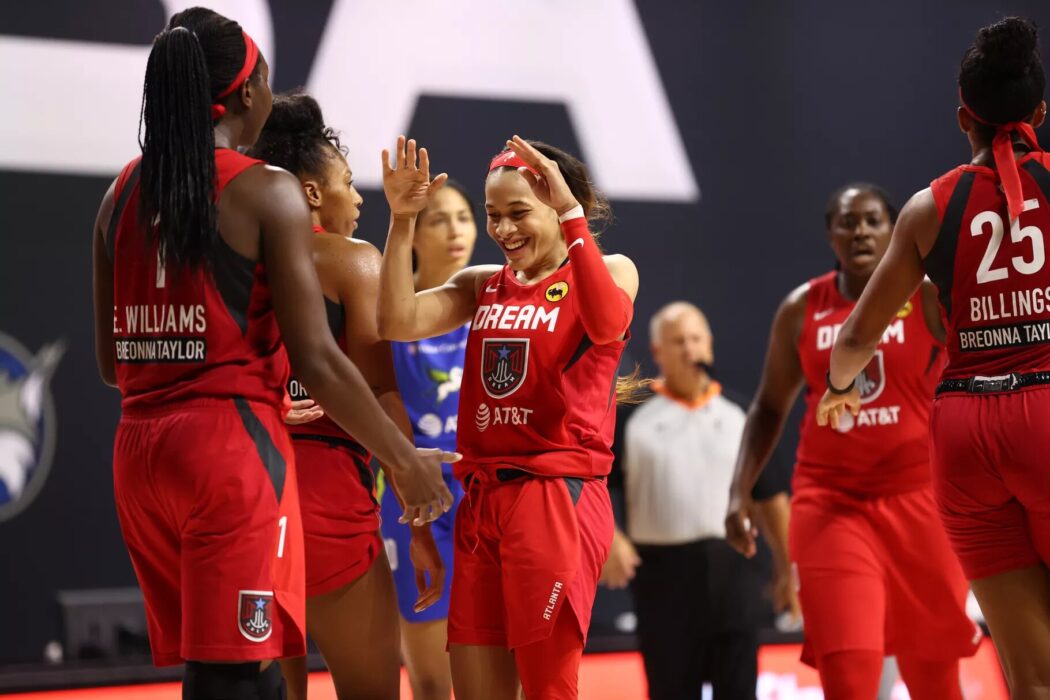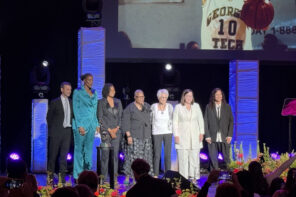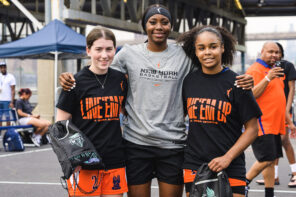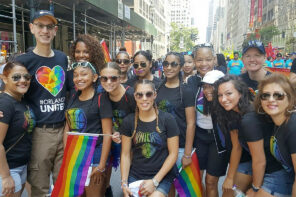In recent years, more and more WNBA content has made its way to Amazon’s Prime Video service. This is not only manifesting itself in terms of select games that are exclusive for subscribers to Amazon Prime Video.
This is also the case with documentaries. One of those documentaries that is on Prime Video currently is “Power of the Dream.” It told the story of the 2020 Atlanta Dream season that involved being placed in the political spotlight thanks to the views of its former owner – Kelly Loeffler.
For those that may have forgot, the 2020 season was one that was contested entirely within the IMG Academy “bubble” in central Florida. While Atlanta struggled on the court throughout much of the abbreviated campaign, it was anything but abbreviated in terms of the political arena.
When Loeffler spoke out against the Black Lives Matter movement – which grew to worldwide prominence following the police murders of George Floyd and Breonna Taylor, this earned her a firestorm of backlash – including from Dream players.
Dream players rallied against Loeffler in support of Rev. Raphael Warnock (of Ebenezer Baptist Church) – Loeffler’s opponent in the 2020 U.S. Senate election in Georgia. While their activism was confined to the bubble because of the pandemic, their voices reached far beyond Florida and Georgia.
Ultimately, Loeffler lost her Senate bid to Warnock. Jon Ossoff also defeated David Perdue in the other U.S. Senate race out of Georgia to give the Peach State two Democratic senators. Loeffler and Mary Brock then sold the Dream to an ownership group that included Larry Gottesdiener, Suzanne Abair and Renee Montgomery.
This documentary is important because it highlights what the real heartbeat of the WNBA is. The WNBA is not merely a basketball league that is comprised of the top 144 (soon to be 156, soon to be 168) players on this planet.
WNBA players are very socially active. Ask Natasha Cloud. Ask Brianna Turner. Ask Layshia Clarendon. Ask its teams. Ask the league itself. Throughout the WNBA, one can see players and teams supporting initiatives ranging from reproductive freedom to equal pay for women in the workplace to ending workplace discrimination against Black women for how they wear their hair.
It was recently said that what makes the WNBA unique is that it is a league where race, sex and gender all intersect at a three-way crossroads. That assessment of the W nailed it. When one sees the WNBA, one sees Black women and one also sees a large amount of women who identify as LGBTQIA+.
This may make a certain subsection of “fans” uncomfortable but that is where the WNBA needs to remember what it is – an unapologetically progressive league. There is plenty of pressure from ignorant “fans” to get Black, Brown and LGBTQIA+ athletes to merely “stick to sports” and be happy with their paychecks.
But WNBA players understand that there is a time to be athletes and there is a time to make a difference in the world. That is what those Atlanta Dream players from 2020 understood. They also understand that there is a time when the ball will cease to bounce and their jerseys will merely be in a case hanging on their memory walls.
Over the past few months, there has been a surge of interest in the WNBA fueled by the heroics of Caitlin Clark. And while Clark has indeed brought new fans to the WNBA, it cannot be overlooked that the majority of these new “fans” are white fans.
A good bit of them are, perhaps, the type that would want the WNBA to abandon its progressive status and return to the days of yesteryear when the league was more hostile towards LGBTQIA+ players.
These are the moments that the W has to look at itself in the mirror and realize something. It must realize that while it is thankful for the surge of interest that has been created, it cannot in any way, shape or form abandon what it truly is simply to make these new “fans” more comfortable (especially given how some of Clark’s “fans” have behaved towards Black players).
Higher-ups at the W need to watch that documentary. Then watch it again – and again – and again – and again – and as many times as possible to understand that Black activism is part of the WNBA’s DNA and it should embrace it confidently every bit as it did during Lisa Borders’ uber-activist presidency.
Because while the 2020 Atlanta Dream may have encountered plenty of growing pains in the bubble that year on the court, that team won something much more meaningful than a championship.




